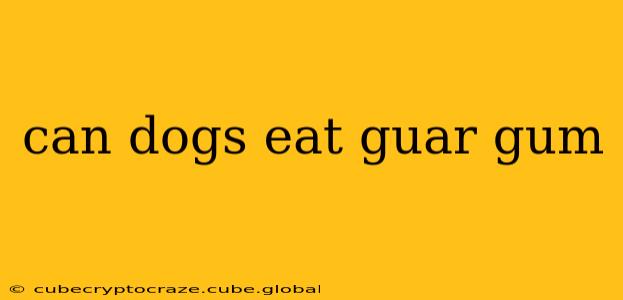Can Dogs Eat Guar Gum? A Comprehensive Guide for Pet Owners
Guar gum, a common food additive derived from the guar bean, is popping up in more and more pet foods. But is it safe for our canine companions? The short answer is: generally, it's considered safe in small amounts, but there are important nuances to consider. This guide will explore the safety, benefits, potential risks, and answer frequently asked questions surrounding guar gum and dogs.
What is Guar Gum?
Guar gum is a natural, soluble fiber derived from the seeds of the guar plant ( Cyamopsis tetragonoloba). It's a polysaccharide, meaning it's a complex carbohydrate made up of many sugar molecules. In human food, it's used as a thickening agent, stabilizer, and emulsifier. Its presence in dog food serves a similar purpose, improving texture and consistency.
Is Guar Gum Safe for Dogs?
The FDA generally recognizes guar gum as safe for human consumption, and veterinary experts generally agree it's safe for dogs in moderation. However, like any ingredient, excessive consumption can lead to problems. The key is moderation. A small amount incorporated into a balanced commercial dog food is unlikely to cause harm.
What are the Potential Benefits of Guar Gum in Dog Food?
Several potential benefits are associated with guar gum in dog food, although more research is needed to confirm their effectiveness in canines:
- Improved Digestion: Guar gum's fiber content can help regulate bowel movements and promote healthy digestion. It can add bulk to the stool, which may help with constipation.
- Weight Management: As a soluble fiber, guar gum can absorb water in the digestive tract, creating a feeling of fullness and potentially aiding in weight management. However, this effect isn't a guaranteed solution for obesity.
- Blood Sugar Regulation: Some studies suggest guar gum might help regulate blood sugar levels, although further research is needed specifically in dogs.
What are the Potential Risks of Guar Gum for Dogs?
While generally considered safe, excessive consumption of guar gum can present some risks:
- Gastrointestinal Upset: Large amounts of guar gum can cause diarrhea, vomiting, or gas in sensitive dogs. Introduce it gradually to monitor your dog's reaction.
- Interactions with Medications: Guar gum can potentially interfere with the absorption of certain medications. Consult your veterinarian if your dog is on medication.
- Allergies: Although rare, allergic reactions to guar gum are possible. Watch for signs like skin irritation, itching, or swelling.
How Much Guar Gum is Safe for My Dog?
There's no established "safe" dosage of guar gum for dogs. The amount will depend on your dog's size, breed, overall health, and the guar gum concentration in their food. Always check the ingredient list of your dog's food. If you're unsure, consult your veterinarian before adding guar gum supplements to your dog's diet.
My Dog Ate a Lot of Guar Gum. What Should I Do?
If you suspect your dog has ingested a large amount of guar gum, monitor them closely for signs of gastrointestinal distress. If they show symptoms like vomiting, diarrhea, or excessive gas, contact your veterinarian immediately.
Can Guar Gum Cause Bloat in Dogs?
While guar gum itself isn't directly linked to causing bloat (gastric dilation-volvulus), excessive consumption of any high-fiber food can exacerbate existing conditions that predispose dogs to bloat. Dogs prone to bloat should be monitored closely and should not be given large quantities of guar gum.
Is Guar Gum the Same as Xanthan Gum?
No, guar gum and xanthan gum are different. While both are used as thickening agents, they are derived from different sources and have slightly different properties. Xanthan gum is a fermented product, while guar gum is derived from the guar bean. Both are generally considered safe for dogs in moderation.
This information is for general knowledge and should not be considered veterinary advice. Always consult your veterinarian before making significant changes to your dog's diet, especially if they have pre-existing health conditions. Your veterinarian can provide personalized guidance based on your dog's individual needs and health status.
